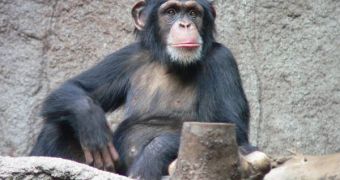Up until recently, humans have lived comfortably with the idea that we are the only species on Earth to be truly altruistic. That is to say, we, as a race, tend to help others of our kind without the other person being necessarily a member of our family, or without the expectation of reward. At times, we are so bent on helping others, that we risk getting ourselves into trouble, and that's truly something to be proud of. However, new studies come to show that chimpanzees share this trait with us to the same extent, despite previous research that held the primates were only helping others out of interest.
And, in a weird way, that should be the case, at least in nature. Darwin basically wrote that evolution was nothing but a fierce struggle between selfish individuals, in which no room could be found for the weak. Under these circumstances, it would stand to reason that selfishness should be the main trait of the animal world, and not compassion or altruism. But it would appear that other species have begun to realize that living together and helping one another is the key to success. This was the method our ancestors followed millions of years ago, when the first human communities were formed.
A study published in 2007 by experts at the Max Planck Institute for Evolutionary Anthropology, led by scientist Felix Warneken, showed compelling evidence that chimpanzees themselves helped others that were not in their families, without expecting reward, and, at times, putting themselves in jeopardy to do so. In a series of experiments conducted on 36 chimps from the Ngamba Island Chimpanzee Sanctuary, in Uganda, the research team tested the way chimps reacted to a human in distress.
They analyzed only the interactions between primates from the wild and caretakers the animals were unfamiliarized with, in order to minimize the degree of error in the research. When the human struggled to reach a stick high in the trees, which the chimpanzees could reach, they almost always went to get it, regardless of whether they got a banana for it or not. However, the team noted that the behavior was only exhibited when the human was actively trying to get the stick, and not just when they stared at it.
In a study involving only chimps, one animal was placed in a cage, outside of a room with food, with a door sealing the way. The passage could only be unlocked by pulling a chain, but the monkey in the cage had no way of reaching it. However, another chimp that could did so on most occasions, showing sympathetic behavior towards its fellow primate.
The study also revealed that the chimps did not act helpfully out of the desire to get a reward, but because they felt like it. Other experiments showed that they intervened regardless of the prize-banana, which means that they do think the ups and downs of helping other through. If they did, they would probably do so more often, in order to benefit from more prizes, Not Exactly Rocket Science reports.

 14 DAY TRIAL //
14 DAY TRIAL //